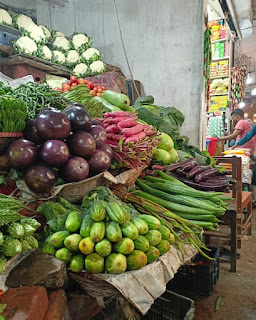Adekunle B (np). 1999 – 2018 documentation by Bamidele Adekunle.
Adekunle, B. (2010). The joint border post at ECOWAS borders. Nigerian Tribune.
Adekunle, B. (2010). Towards securing ECOWAS borders. This Day; All Africa.com West Africa: Towards Securing Ecowas Borders - allAfrica.com
Adekunle, B and Filson G. (2015). What African countries must do to boost trade among themselves. The conversation. What African countries must do to boost trade among themselves (theconversation.com)
Alawode, B. (2020, September 23). How to Pack for your trip to Canada- Food you can and can’t bring into Canada from Africa (2022). Mychopchop. https://www.mychopchop.ca/
Arise News – Customs Boss Warns Against Smuggling- Bashir Adeniyi. Customs Boss Warns Against Smuggling - Bashir Adeniyi - YouTube
Banks (2005) cited under British Illicit Trade with Spanish America
Baumol. J. W., (1990). Entrepreneurship: Productive, Unproductive, and Destructive. Journal of Political Economy, Vol. 98, No. 5, Part 1 (Oct. 1990), pp. 893-921. Accessed: 07/01/2012 17:02
Blakemore, E. (May 9, 2023). America’s First Multimillionaire Got Rich Smuggling Opium. America’s First Multimillionaire Got Rich Smuggling Opium | HISTORY
Britannica, T. Editors of Encyclopaedia (2023, September 15). opium trade. Encyclopedia Britannica. https://www.britannica.com/
Burgis, T. (2015). The Looting Machine: Warlords, Oligarchs, Corporations, Smugglers, and the Theft of Africa's Wealth. United Kingdom: Public Affairs.
Chatterton, E. Keble (Edward Keble), 1878-1944. (1912). King's cutters and smugglers 1700-1855 / by E. Keble Chatterton. London : George Allen
Eugene R.H. Tesdahl (Nov. 21, 2017) - Smuggling, the American Revolution, and the Riverine Highway. Smuggling, the American Revolution, and the Riverine Highway - Omohundro Institute of Early American History & Culture (wm.edu)
Gallien M., (2020). “Informal Institutions and the Regulation of Smuggling in North Africa”. Perspectives on Politics, 492-508, 18(2) https://www.cambridge.org/
Government of Canada, Canadian Food Inspection Agency. (2023, October 24). Bringing food into Canada for personal use. https://inspection.canada.ca/
Hanna G. M. (2013) Smuggling - Atlantic History - Oxford Bibliographies
History of Europe | Summary, Wars, Map, Ideas, & Colonialism. (2023, October 20). Encyclopedia Britannica. https://www.britannica.com/
Holpuch, A. (2023, January 25). The Newest Contraband at the Mexican Border: Eggs. The New York Times. https://www.nytimes.com/2023/
Janssen, Stephen T. Smuggling laid open in all its Extensive and Destructive Branches. 2nd ed. W. Owen and W. Nicoll, 1767.
Jones, E.T. (2001). 'Illicit business: accounting for smuggling in mid-sixteenth century Bristol'. Economic History Review, 54 (2001); E. T. Jones, Inside the Illicit Economy: Reconstructing the Smugglers’ Trade of Sixteenth Century Bristol (Ashgate, June 2012).
Kirzner, I. M., (1997). Entrepreneurial Discovery and the Competitive Market Process: An Austrian Approach. Journal of Economic Literature, Vol. 35, Issue 1 (Mar, 1997) pp 60 – 85.
Koot, J. C. (2016). Smuggling in Early America. Oxford Research Encyclopedia of American History, January 2016. Retrieved 8 Sep. 2023, from https://oxfordre.com/
Lantican, T. & Ani, P. (2022). “The Philippine fight against agricultural smuggling: review of government Policies and Initiatives”. Food and Fertilizer Technology Center for the Asian and Pacific Region.https://ap.fftc.org.tw/
Limited, B. P. P. C. (n.d.). Pork smuggling into Thailand soars. Bangkok Post. Retrieved September 27, 2023, from https://www.bangkokpost.com/
Mielants, E. (2002). Europe and China compared. Review - Fernand Braudel Center for the Study of Economies, Historical Systems, and Civilizations, 25(4), 401-449.
Otuh, P. I., Ogunro, B., & Etim, E. (2013). Formaldehyde Levels in Imported Frozen Poultry Meat in Ibadan, Nigeria: Its Public Health Implications.
Rosenberger, Bree (2020). "The British Smuggling Dilemma: 1698-1784," International ResearchScape Journal: Vol. 7, Article 5. DOI: https://doi.org/10.25035/irj.
Youngman, A. (1908). The Fortune of John Jacob Astor. Journal of Political Economy, 16(6), 345–368. http://www.jstor.org/stable/
To listen to this episode: https://spotifyanchor-web.app.link/e/qDi97QXUDEb




,A%20popular%20drink%20in%20Bangladesh%20.jpg)
.jpeg)
